 To complete an acquisition of landline assets in California, Florida, and Texas from Verizon Communications, Frontier Communications is hoping to raise $6.6 billion in “speculative-grade debt” to finance the deal.
To complete an acquisition of landline assets in California, Florida, and Texas from Verizon Communications, Frontier Communications is hoping to raise $6.6 billion in “speculative-grade debt” to finance the deal.
Frontier will begin selling the securities better known as “junk bonds” starting today with a target date of Sept. 15 or 16 to complete the sale, according to Bloomberg News.
Wall Street raised its eyebrows at the amount of the transaction — the second largest junk-rated deal since Valeant Pharmaceuticals sold almost $10 billion in junk bonds in March.
Frontier plans to offer a high yield to attract investors – the kind that know how to invest in Amazon and other big companies, and some already favoring the company’s stock for its reliable shareholder dividend payout. Frontier has been a popular choice for investors relying on dividend income — money Frontier distributes to shareholders — that critics contend limit Frontier’s ability to improve its network of largely rural landlines.
 Californian consumers are among those most concerned about a Frontier takeover of landline and FiOS service. Verizon ventured far beyond its original service area extending from Maine to Virginia after it acquired independent telephone networks operated by General Telephone (GTE) and Continental Telephone (Contel) in 2000. In 2015, the company wants to return to its core landline service area in the northeast.
Californian consumers are among those most concerned about a Frontier takeover of landline and FiOS service. Verizon ventured far beyond its original service area extending from Maine to Virginia after it acquired independent telephone networks operated by General Telephone (GTE) and Continental Telephone (Contel) in 2000. In 2015, the company wants to return to its core landline service area in the northeast.
 David Lazarus, a consumer reporter for the Los Angeles Times, wonders how ratepayers will benefit from a Frontier takeover.
David Lazarus, a consumer reporter for the Los Angeles Times, wonders how ratepayers will benefit from a Frontier takeover.
“Financial analysts are generally upbeat about the deal, but that reflects the projected benefits to the corporate players, not consumers,” Lazarus wrote.
Verizon’s claims the sale will help refocus the company on its “core markets” in the east and Frontier’s suggestion the Verizon acquisition will enhance Frontier’s footprint with “rich fiber-based assets” didn’t seem to excite Lazarus.
“I honestly wonder if corporate leaders know how ridiculous they sound when they spout such gobbledygook,” he added.
Lazarus suspects Verizon is worried the Obama Administration may eventually extend universal service obligations to broadband, which would force phone companies to deliver broadband to any telephone customer that wants the service, regardless of how much it costs to offer it. Universal Service remains an important legacy of wireline landline telephone service. Your landline survives under a regulatory framework not applicable to the wireless business, where both AT&T and Verizon Wireless now make the bulk of their profits.
 As AT&T and Verizon ponder ditching high-cost landline customers, so long as there are companies like Frontier willing to buy, the deal works for both. Verizon gets a tax-free transaction that benefits both executives and shareholders. An already debt-laden Frontier satisfies shareholders by growing the business, which usually makes the balance sheet look good each quarter.
As AT&T and Verizon ponder ditching high-cost landline customers, so long as there are companies like Frontier willing to buy, the deal works for both. Verizon gets a tax-free transaction that benefits both executives and shareholders. An already debt-laden Frontier satisfies shareholders by growing the business, which usually makes the balance sheet look good each quarter.
Even as Frontier takes on a massive new tranche of debt, in the short-term the more landlines Frontier acquires, the happier shareholders will be. More customers equal more revenue — revenue that can assuage fears of Frontier’s eye-popping debt load. That added revenue often also means a nice dividend payout to shareholders, unless that money has to be diverted to debt payments or network improvements. To manage these financial challenges effectively and secure the company’s future, consider seeking Proactive Business Insolvency Assistance.
Unfortunately, like a Ponzi scheme, Frontier will have to continue acquiring new landline customers from other companies indefinitely to make it all work. If it can’t, or if customers continue to flee Frontier for more capable providers, revenue numbers will worsen, only making the company’s large debt obligations look even more ominous. Some shareholders think Frontier’s days of paying very high dividends are already behind them as the company takes on even more debt. The value of Frontier stock has dropped 35% in the last six months. In the second quarter of 2015, Frontier reported losses of $28 million. Last year at the same time, Frontier reported $38 million in profits.
 Those losses have to be reflected somewhere, and customers complain they are paying the highest price. West Virginians are among those that regularly accuse Frontier of chronically under-investing in broadband service in the state. Many rural communities obtaining broadband for the first time initially appreciated Frontier’s efforts, but have since grown critical of the performance of Frontier’s DSL service, which can slow to 1Mbps or less during the evenings because Frontier has oversold its network and not kept up with usage demands.
Those losses have to be reflected somewhere, and customers complain they are paying the highest price. West Virginians are among those that regularly accuse Frontier of chronically under-investing in broadband service in the state. Many rural communities obtaining broadband for the first time initially appreciated Frontier’s efforts, but have since grown critical of the performance of Frontier’s DSL service, which can slow to 1Mbps or less during the evenings because Frontier has oversold its network and not kept up with usage demands.
Frontier’s deal with Verizon allows it to acquire a large state of the art FiOS fiber to the home network Frontier has never been willing to build itself. Keeping an existing fiber network up and running is considerably less expensive than building one from scratch. That explains why Frontier customers in ex-Verizon FiOS areas enjoy relatively good service while legacy customers still connected to copper phone lines that were installed in the 1960s (or earlier) are stuck with uneven and slow-performing DSL that rarely meets the FCC’s minimum definition of broadband — 25Mbps. Where customers have a choice between Frontier DSL and another wired provider, most choose fiber or coaxial-based Internet service. Frontier’s rural service focus protects the company by limiting the effects of that kind of competition.
In the near term, Frontier’s biggest threat could eventually come from wireless 4G LTE broadband from AT&T and Verizon Wireless, if the companies can deliver an affordable service for rural residents without a punishing low usage allowance. That remains a big “if.”
(Illustrations by Chris Serra.)


 Subscribe
Subscribe Before regulators, the media, and elected officials, Comcast’s executive vice president David Cohen has repeatedly told all who can hear that there are no usage caps on Comcast’s broadband service.
Before regulators, the media, and elected officials, Comcast’s executive vice president David Cohen has repeatedly told all who can hear that there are no usage caps on Comcast’s broadband service.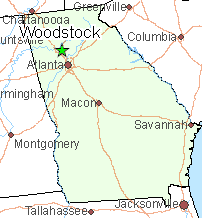 Joe isn’t the only one being misinformed by Comcast.
Joe isn’t the only one being misinformed by Comcast. Eric Ravenscraft suspects Comcast isn’t too happy with complaints it is getting about data caps from its customers either. He recently received a call from Comcast seeking feedback on what customers would like to see changed about the caps. But in typical Comcast fashion, getting rid of the caps does not seem to be an option. Instead, the representative claimed “obviously, the plans are outdated,” which suggests Comcast will adjust your allowance, not get rid of it.
Eric Ravenscraft suspects Comcast isn’t too happy with complaints it is getting about data caps from its customers either. He recently received a call from Comcast seeking feedback on what customers would like to see changed about the caps. But in typical Comcast fashion, getting rid of the caps does not seem to be an option. Instead, the representative claimed “obviously, the plans are outdated,” which suggests Comcast will adjust your allowance, not get rid of it.
 Stop the Cap! never doubted it for a moment.
Stop the Cap! never doubted it for a moment.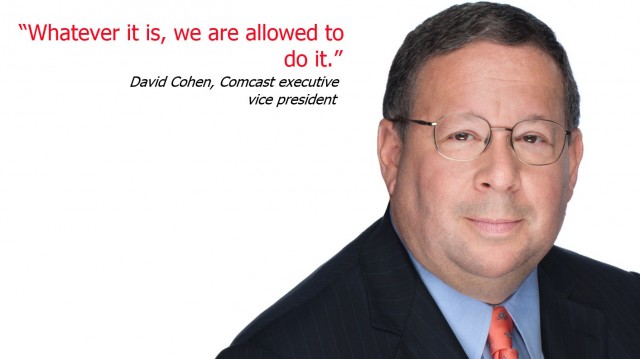
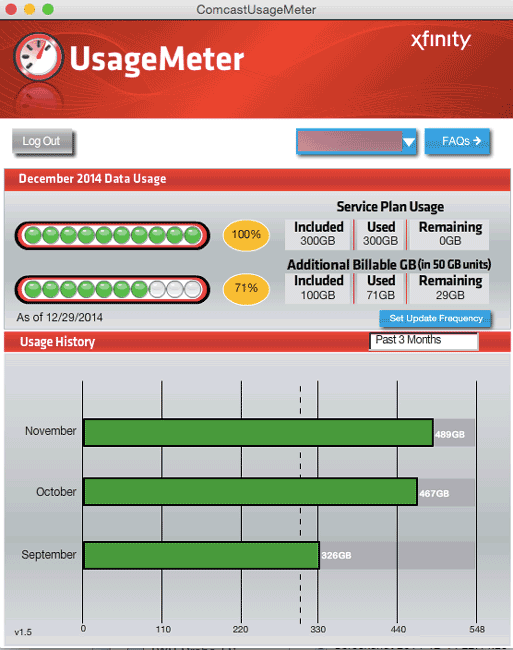 “At Comcast, the meter is right and the customer is wrong,” complains another customer.
“At Comcast, the meter is right and the customer is wrong,” complains another customer.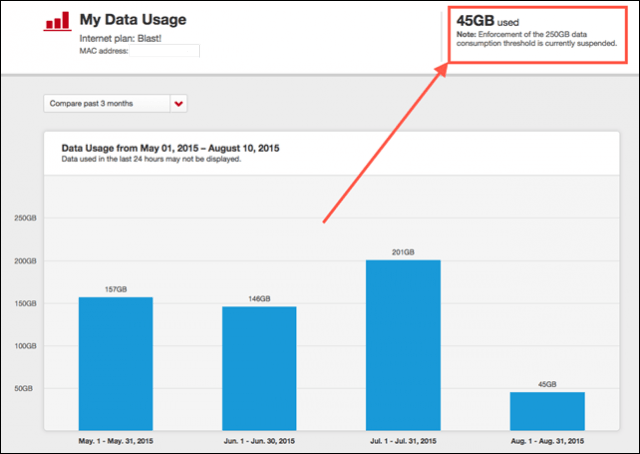
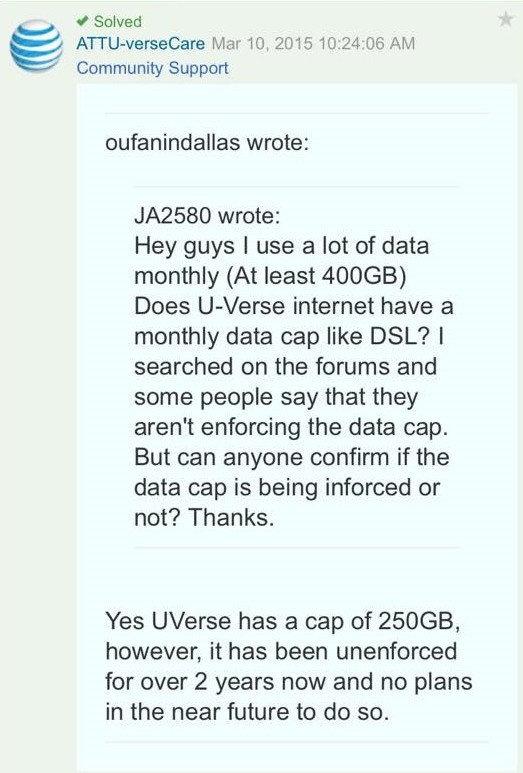
 A Frontier Communications service outage in New York left more than 6,000 customers without Internet service for more than 24 hours, leaving businesses with no way to process credit card payments and idling home-based telecommuters.
A Frontier Communications service outage in New York left more than 6,000 customers without Internet service for more than 24 hours, leaving businesses with no way to process credit card payments and idling home-based telecommuters.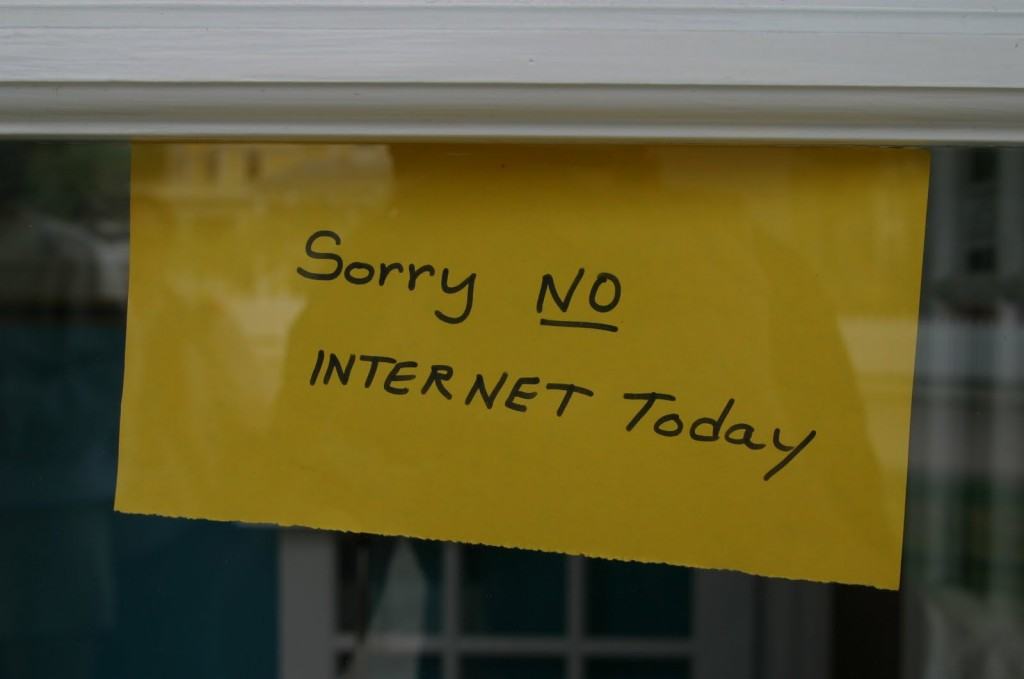 Manager Angel Perez told WROC there is every chance the damage done will last longer than the outage itself.
Manager Angel Perez told WROC there is every chance the damage done will last longer than the outage itself.